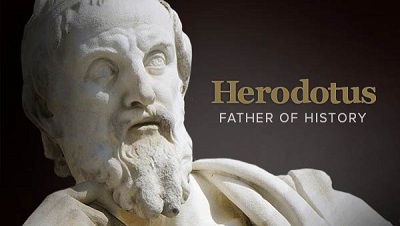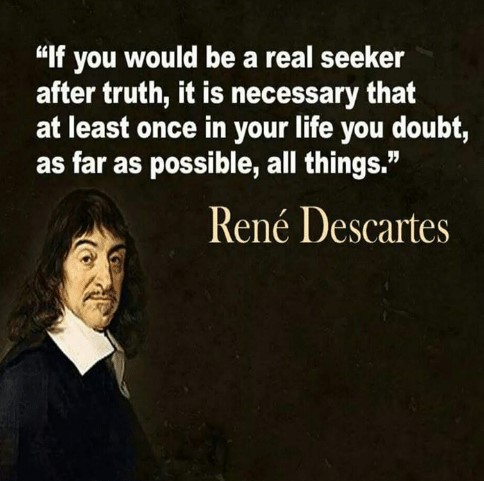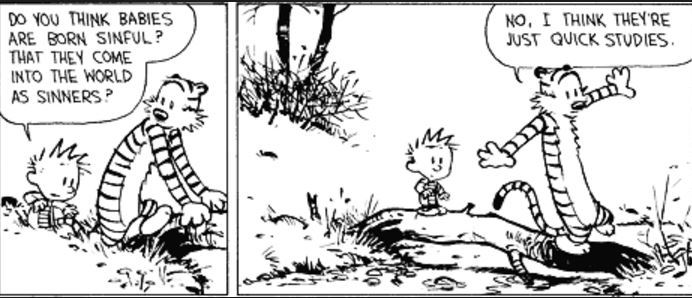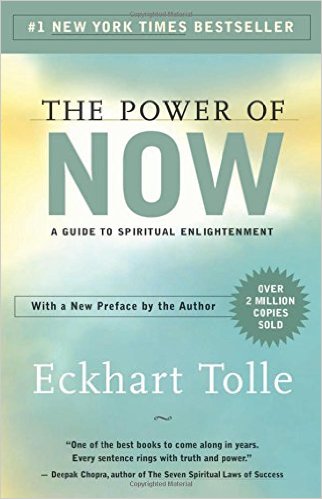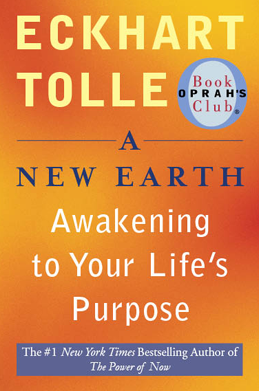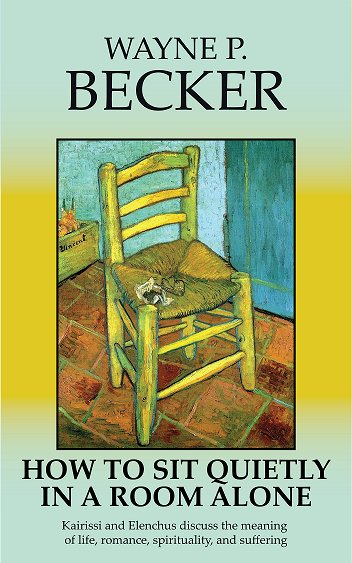|
home | what's new | other sites | contact | about |
|||||||||||||||||||||
|
Word Gems self-knowledge, authentic living, full humanity, continual awakening
Editor's 1-Minute Essay: Guilt guilt is a mind-virus
finding freedom from church-inculcated guilt The subject of "guilt," complex and multi-faceted, defies easy definition. Along with forgiveness and fear of death, this topic troubles people as does few others.
guilt and conscience We speak of "violating one's conscience," as if a moral law were written upon it. Infractions produce what we call a sense of guilt. Strange, though - people feel guilty about different things. The very word "conscience" literally means, "with knowledge"; that is, the conscience might be instructed, informed, concerning what is right and wrong.
written on wax A moral law might be written upon the conscience -- but it's "written on wax"; the content can be changed with better information.
But our wishes give way to new ones, as we grow and see more.
the family prejudice Conscience seems to have little intrinsic wisdom to draw upon but will accept as "God's truth" whatever it's fed: "garbage in, garbage out." All of the following atrocities, at various times, in different societies, were considered to be right, moral, and the good thing to do: Will Durant's Story Of Civilization offers anthropological studies revealing a vast array of definition concerning morality: Cannibalism, ritualistic killing, infant sacrifices, slavery, child marriages, harems, body-mutilation, and the like can seem perfectly normal if one's communal group bestows "divine numen" to bless these barbarities as fine-and-dandy. If the moral law is written upon conscience, then each person seems to serve as one's own legislative agency in the crafting of private laws and standards. It becomes very clear that we can be conditioned, programmed, robotically automated - by parents, education, culture, group-think - to believe and accept anything to be "good" or "bad." Elsewhere, we've discussed how people believe all sorts of things. And mainly, they believe what they were taught since early childhood. This kind of credulity is often culturally determined; in most cases, the basis of what we believe is just a family prejudice. geography as basis of credulity If you were born in the Far East, you might call yourself a Hindu or a Buddhist; if your parents lived in the Middle East, you might be Islamic; in other parts of the world, your heritage will have been Christian. Typically, belief-systems, carefully inculcated since the time a grandmother dandled a child on her knee, are defended as "right" and "good," with other viewpoints, by default, seen as "wrong" and "bad." In times past - but still today in some parts of the world - people of contrary belief-systems were considered to be so "wrong" and "bad" that they needed to be killed. Within such egocentric and idolatrous worldview, each person fanatically imagines him- or herself to be center of the universe, God's elect, sole repository of the "one true" religion, the "one true" sacred book, the "one true" set of doctrines - and even The Almighty suffers diminution as private property, now given billing as "my" God, the "true" God, as opposed to infidels who worship a "false" God.
a positive aspect of guilt The human capacity to experience guilt suggests that we were designed to know the difference between good and bad. When we slip over the line into something not-so-good -- in terms of definition supplied by the malleable conscience -- red warning lights go off within the deeper person. People without this internal guidance system we call sociopaths.
preprogrammed disquietude, an example of individualized conscience: a farm boy's methodically-instilled unease at 5 o'clock I am 10 years old, and I've spent this Sunday afternoon on the adjacent farm, just down the lane, playing with the neighbor kids. No matter how engrossed I am in play, however, I never forget to leave at 5 o'clock for milking time. It's not that I'm so dedicated to the work, or so diligent, but that Dad has no sense of humor about my being late for assigned tasks. How I hate to stop playing and having fun; how I dislike the 5 o'clock hour. Fast forward 8 years. I'm now at university. I've been here for some time and have just returned from class. Suddenly, a certain unease creeps over me. It's 5 o'clock, and warning buzzers go off in my head. Though the farm is far away, and I don't see it much anymore, conscience has yet to modify itself to my new life. It will be many years before it does so.
for most, the big issue is religious guilt The subject of guilt in its myriad forms cannot be addressed here; most people, however, will be concerned about one aspect, that of, religious guilt.
religious trauma syndrome (RTS): a church-inspired sense of pervasive guilt On the "Guilt" main-page, you will find quotations from many who suffer from RTS; if you've not read these testimonies, I would encourage you to do so before proceeding here. An internet search of this subject will bring up a great number of references to "Catholic guilt." The RCC is a big organization and a big target, and so we should not be surprised to find it mentioned in any RTS study. But this is unfair. To suggest that RTS resides in the domain of one, single church-organization grossly distorts and trivializes the issue, one of pandemic proportion. The testimonies refer to RTS sufferers from many churches, and, I venture to say, if we spoke long enough and invited enough participants, nearly every church in the country would be called to task.
psychologists categorize 'guilt' in many ways but, for our RTS purposes, I see two primary forms of guilt (1) specific-infraction guilt: We did something wrong; or, we thought about it and wished for the forbidden fruit. We broke a rule, stepped over the line, we're in the wrong; at least, we think so. Our internal guidance system flashes "warning, danger, trouble ahead." We feel guilty about the trespass. In time, we forgive ourselves, the internal guidance system sinks back into quietude, and we're done with it, but for the lesson, which becomes assimilated as an aspect of our wisdom. (2) generalized existential guilt: We didn't do anything wrong, and we live a pretty decent life; but we're often told directly, or implicitly via anti-humanistic church doctrines, that we're "worthless sinners, deserving of God's wrath." Editor's note: I discovered that Ayn Rand spoke of this, as well. She called it "unearned guilt," a means by which rogue collectivist institutions enslave the mind. Every night before bed we mentally check ourselves for sin, but can't really come up with much; yes, ok, there was that incident in the parking lot recently when somebody nipped into the space we'd been waiting for, and we did lose our cool for a bit, but other than that, and similar small things, we try hard to live a good life. Even so, at church every Sunday we're reminded, in sermons or by the innuendo of official teaching, how rotten and depraved we are; how we "were conceived and born in sin"; how we're so bad that God couldn't just forgive us, like normal people do, but that a lot of blood had to be spilled by his son just to get us back to zero. In fact, we've been hearing this demoralizing gloom-and-doom message since we were old enough to remember anything at church. Little wonder then, we feel guilty, pretty much all the time; and when there's a quiet moment, we imagine ourselves falling below some standard somewhere, never quite making the grade, never measuring up, never altogether pleasing God -- no matter how hard we try. This generalized floating sense of guilt doesn't end. It's part of the air we breathe and the Cheerios we eat in the morning. It consumes our vitality, drains our spirit, and robs us of the joy of living. This is "existential guilt."
psychological child abuse Many of the posted testimonies speak of RTS as child abuse: "From a psychological standpoint, [existential] guilt makes a great deal of sense. It’s no surprise that a child who is repeatedly reminded of their inadequacy, dirtiness, and worthlessness will most likely become an adult who struggles with feelings of guilt and shame, one who never feels clean, worthy, valuable, adequate, or forgiven. One who is never at peace." This should be obvious truth to any thinking person. Little children, sweetly gullible as they are, view parents and teachers as unimpeachable god-figures - and, in the main, will believe, as unquestioned gospel truth, whatever is presented to them. guilt is a mind-virus If a big imposing figure in a black robe fulminates from a lofty pulpit that they are wretched and vile, of course, they will cringe and believe this god-figure.
And to take advantage of these open-eyed, impressionable, little creatures, by teaching them absolute rubbish concerning innate depravity, how wicked they are, and how God could never love them for their own sakes, unless a lot of blood is spilled, is nothing short of the most vile and offensive child abuse.
Federico Faggin, Silicon: “I was born into a new life every time a mental structure made of prejudices, obsolete teachings, and uncritically accepted beliefs was shattered and I came out as if freed from prison. I was born to a new life every time my mind, observing from a new point of view, expanded to broader and new understandings. Above all, I was born to a new life when I stopped rationalizing and began listened to my intuition, opening myself to the mystery of my own consciousness... I had received a traditional Catholic education that filled me with dogmatic answers to questions I didn’t yet have the maturity to ask. Exactly the opposite of wise teachings of ancient philosophers like Plutarch, who said: The mind is not a vessel to be filled, but a fire to be kindled.” Editor’s note: Inventor of the first computer microchip, Dr. Faggin went on to pioneer the new science of consciousness, the primary reality, not matter. And if “the One”, as he uses the term, that is, Universal Consciousness, becomes singular pervasive reality, then it, in its essence, will display the fundamental characteristics of consciousness: meaning, significance, awareness, qualia, comprehension, feeling, free will, intuition, discovery – none of which fits well with, is altogether antithetical to, the presumptuous and abusive filling young minds with dogmatic answers to questions that have not been asked.
how cultish organizations justify their psychological child abuse In all of history no small ego-led power-structure of this world has ever voluntarily, without threat of some retaliation, laid down its claim to lord it over others. Not one example. Therefore, we should not expect cultish church leadership to admit to wrong-doing in this regard, nor to speak openly and cogently on the matter. In the "Clear Thinking" article I outline many examples of sophistical, dishonest argumentation. We see them come to life in the official responses of church hierarchy to charges of psychological child abuse (not to be confused with charges of pedophiliacal child abuse; so many forms of child abuse to keep track of with these, "God's servants"). Let's bring to mind the aforementioned forms of guilt: (1) specific-infraction guilt (2) generalized existential guilt Here's how Dear Leaders attempt to absolve themselves: a line of reasoning appropriate to Guilt #1 is unwarrantedly tied to Guilt #2. It's a sleight-of-hand switcheroo. Allow me to paraphrase what they say: "The whole issue of burdensome guilt is overblown. Guilt is a good thing. It's a blessing from God, and we should be happy to experience it. We are moral creatures, made in the image, and when we do something wrong our conscience is just a form of God's voice, the moral law within, warning us to get back to the straight-and-narrow. But this world lives far from God's will and moral precepts. All of this talk about overburdening guilt is from people who do not want to obey God's laws. They are rebels and sinners at heart and resist the call of the inner moral code. The Church, as God's agent on Earth, stands ready to help these wayward souls, but many people do not want to draw near to God." Do you see how the game is played? It's pseudo-pious justification, empty god-talk, cloaking malfeasance. These church-politicians are slippery and will oil their way across the room to meet you. Their response might fit somewhat well for when we do something wrong, "specific-infraction guilt"; as we discussed above, guilt in this sense has a positive aspect to it. But that's not the issue here at all. Cult leaders will never mention "existential guilt," a floating non-specific sense of guilt that poisons one's spirit on a somewhat permanent basis - a result of their own dark-spirited teachings. Their disingenuous answer completely side-steps the real problem and is a "snowballs in July" defense designed to protect the power-structure hierarchy, while doing what they do best - blame the victim!
great sailing ships, safe at harbor
finding freedom from church-inculcated guilt It is not easy to psychologically extricate oneself from the mind-control practices of cultish organizations - they've had lots of experience on how to "pull the strings" of people. Not easy, because mental habit-patterns of victims have been developed over many years, often, since early childhood, and these will not surrender to the shimmering sunlight of sweet reason in a day. However, the good news is this: many have, in fact, found freedom for their lives and spirits, myself included, and you will be able to enjoy this liberty, as well.
no formulaic way While ultimate emancipation is assured, there is no immediate "royal road" to redemption here, no "seven magic steps" to rebuild the pillaged conscience. It will need to be re-programmed, re-instructed, having been violated by those seeking to keep you dependent and servile. A little time will be required to effect the desired healing. I would say, essentially, the primary task is to learn to love and respect oneself. Meditation practices will displace the destructive bad "movies" and "scripts" that have long played in one's head, all of which clamor for self-condemnation. But these will be neutered. Tolle explains how (see below). It has to do with "shining an inner-light" of awareness on the diseased aspects of the mind, thereby extracting power from them. When we no longer nourish these guilt-hued psychic abnormalities with affirmation and identification, they will begin to shrivel, like an unwatered plant.
access your real self The ultimate and lasting solution lies in accessing the deepest inner person, the "true self," made in the image. At that level of being, we find our sacred perfection, perceptions of wholeness and peace, in our oneness with God. Typically, during one's immaturity, the conscience will have been educated and led by the small ego, the false self; but as we come into our spiritual maturity it will now be informed by the true self. You'll want to regularly study and meditate upon the information in Tolle's books:
And I would also recommend my book: get the facts, submit everything to reason, 'test the spirits,' reject all superstition-dogma masquerading as knowledge; accept nothing, from any source, unless you verify it as truth by way of resonance with the energies of your deepest person, the sacred soul We live in a world of fake news, fake doctrine, fake spirituality, fake history, fake authority. It's The Lying Teacher in all of his guises. Be very careful what you accept as true. In the New Testament document of Galatians, Paul, essentially, says that he had to start over again, had to reject everything, doubt everything, he once thought he knew to be real and solid. For him, he had to set aside Jewish tradition going back thousands of years to Abraham. This was not easy for him, the loyal son of Jewish law. Rene Descartes: "If you would be a real seeker after truth, it is necessary that at least once in your life you doubt, as far as possible, all things." Francis Bacon: "If a man will begin with certainties, he shall end in doubts; but if he will be content to begin with doubts, he shall end in certainties." I submit to you that this episode of soul-searching, of investigating everything, of casting away the dross of authoritarian cultish teaching, will be part of the path forward for every thinking person.
We've discussed how typical church doctrines encourage a sense of self-loathing resulting in perpetual guilt. The essential sum-and-substance of these teachings has found its way into most churches of the world. I will make a statement that will seem extreme; that is, until you look into the matter for as many decades as I have. I assert that almost everything that the churches of this world teach is either patently wrong or sufficiently tainted with error, such that, any normally-resulting benefit has been severely compromised and mitigated. It's like this: some of it might be whole-wheat bread, but if it's laced with arsenic, it's best to just say no. My core articles serve both as warning of error and guide to better perceptions of spirituality:
self-love and knowledge These two friends will serve you well and will not be unfaithful to your highest and best interests. They will strengthen and nourish you on your reclamation-journey to peace of mind and enhanced well-being. You will soon, in due time, with rising confidence daily, assuredly find your way out of the mental trammelings of existential guilt imposed upon you these many years. All the very best to you.
Spirit Guide Abu discusses two illusions, sin and guilt Editor’s note: The following discussion on sin and guilt is from Spirit Guide Abu, 3500 years on the other side, who spoke through trance-medium Rick Rickard during the 1950s. Abu's testimony was tape-recorded and transcribed, posted in the book, “Abu Talks, Volume One,” chapter three. Editor's note: Sin is not what we've been told. See the article. While Abu had spoken on these topics before, a lady in the group continued to have unresolved issues with “sin” and “guilt” and asked for further clarification. Editor’s note: Teacher Abu’s response to the lady I count as very sensitively offered. He lays down no law. He speaks empathetically as an older brother who’s trodden the same path as anyone else. His only commendation, if it exists, is to have explored these universal issues as an advance-guard. guilt is a mind-virus Abu says that the nettlesome topics of sin and guilt find their shadowy substance in a misunderstanding of one’s own status before God. He says the key to resolution here is to “come into a relationship with” oneself: “I would venture to say ... even particularly educated mankind is in fact in no sense really in a true relationship with itself.” He said this is so because mankind’s “own ego” is “smothered, is overlaid by accretions, by ideas and by notions, which have slowly grown up over the centuries,” and this concept of ego has become known as mankind’s “second nature.” Editor’s note: In his own words, without popular terminology, Abu explains the important concepts of sin, guilt, the dysfunctional ego, the false self, and the true self. If I may suggest, I recognize that he, indeed, does understand the deeper meanings of these concepts because I, too, have experienced the better definitions, and therefore I find great authenticity in the Spirit Guide’s teaching here. Abu: “Man has generally refused to enter into true relationship with himself.” He says that this “relationship” consists of a correspondence between “the conscious thinking part of the mind of man” and “the greater part of the mind of man.” This is “the relationship which is vitally important, and if [mankind] shall arrive at a happy … relationship between” these two parts, then, with such individual, there "will be peace within himself” or herself. In the aftermath of this harmonious relationship of self, “the concept of sin will not have weight with him [or her]” and there will be no sense of “guilt because the process of self-realization, which is the realization of that relationship” of the two parts of the person, will have been consummated. Let’s sort this out. All of the following concepts have been described at length in many Word Gems articles, but we’ll recap: The “conscious thinking part of the mind of man”: It is the “voice in the head,” the chattering ego, which is owned by “the false self.” This is the part of us, the thoughts of the mind, which people assume to be “the real me,” but this is not so. The “greater part of the mind of man”: The “true self,” the soul, the deeper inner person, which serves as wordless monitoring presence to our activities. This is the aspect of us that steps back from the thinking mind and knows that we are thinking. guilt is a mind-virus When we come into “relationship with ourselves,” as Abu terms it, we will clearly sense the difference between these two aspects of self. And when we do, notions of sin and guilt automatically fall away into a nothingness. For the benefit of the questioning lady, and for all of us today, Spirit Guide Abu has more to say about this. Abu: “This process of self-realization is not a simple one, for … the thinking part of man’s mind has become cluttered up, if I may use such a word, with debris, with rubbish in many cases, which inhibits the very process of self-realization,” and so “it is necessary for [mankind], before he can come to grips with himself [to enter into relationship with the self], to throw away a great deal of the lumber with which the [thinking] mind is necessarily cluttered. Necessarily, because of the accident of birth, place, and time ... the lumber [is created] of which I speak ... [The process of entering into relationship with oneself] is a difficult process to commence consciously, because the [thinking] mind has apparently no external standard by which to judge, which of its contents are [useless] lumber and which are of value.” Newcomers to this field will be confused as to what Teacher Abu is talking about, but once we gain even a glimpse of the process, we will know exactly what he means. It’s a universal dynamic. Let’s make it clear for all students: “the thinking part of man’s mind has become cluttered up”: In a thousand pages we’ve discussed how the dysfunctional ego, to assuage its sense of fear and neediness, will attempt to identify with all manner of external “strong father figures,” so that it can find safety for itself. We’ll borrow a paragraph from Dr. Ernest Becker in the “Reason Behind The Reason” article who puts it well: "Man could strut and boast all he wanted [trying to deny his fear of death], but he really drew his 'courage to be' from [the things he identified with,] a god, a string of sexual conquests, a Big Brother, a flag, the proletariat, the fetish of money, and the size of a bank balance." lumber, debris, rubbish: This would be all of Dr. Becker’s stated examples, all the things that people think “this is the real me” but are not. It’s anything the “false self” tries to identify with in order to feel less needy, to counteract the sense of “I don’t have enough” because “I am not enough.” To engage in such illusion is the spirit of cultism, to draw one’s sense of strength from, to identify with, an outside authority, guru, or center of certainty. However, to do so, as Teacher Abu points out, is to derail the process of entering into relationship with oneself – instead we meet with perceptions of weakness, helplessness, sin, and guilt.
“the lumber … because of the accident of birth, place and time”: Recall the assertion of Herodotus, people believe everything under the sun, depending on where they grew up, local culture and religion. He said that the Greek word “nomos,” that is, “custom, law, observance” defines for the uncritical mind definitions of truth, goodness, and beauty. These “accidents of birth, place, and time” – all of them different for all cultures of the Earth – have but one thing in common: they serve to keep us from entering sacred “relationship with oneself” and, in consequence, keep us trapped in provincial notions of sin and guilt. guilt is a mind-virus “the [thinking] mind has apparently no external standard by which to judge, which of its contents are lumber and which are of value”: When the ego identifies with some external “powerful father figure,” it becomes, in a sense, one with it, surrenders its autonomy to it – the essence of cultism – and in so doing loses its ability to objectively step back to evaluate what is real and what is not, that is, what is part of “the real me” and what is mere illusion of the false self. Abu now directly addresses the lady’s question: “My sister had used the word[s] ‘guilt’ [and ‘sin’], and I would wish to define, if I may, these two words… Sin then is to be regarded as the offence, be it of omission or of commission… [Following this, there will be] a feeling of guilt… Editor’s note: There will be a “feeling” of guilt, but it is not part of the real you, only a mind-virus. Abu: Concerning sin, as the term is popularly used, it “implies an offence… We have done those things that we ought not… and have left undone those things we ought to have done.” Our feelings of guilt speak to us of an awareness of infraction, and usually in our estimation, debt to be repaid. The Spirit Guide offers discussion on how our notions of sin and guilt might apply to our fellow-beings. It happens when we take more than our due, at another’s expense; we cause injury. None of this is unusual among immature children, and there are ways to rectify all of this, he says, either in this world or the next. It's not really such a big deal in the cosmic view of things. you cannot sin against God And then Abu addresses the “elephant in the room” – what about our offences toward God? He would be gently smiling, professing: “My children, it may be difficult for some to accede to the words that I am about to use, but I say clearly to you now that – you cannot sin against God.” He explains that God cannot be offended. God is well aware of the frailties and foibles of hapless humankind and cannot become angry at anything we do. Mother-Father God is like an indulgent parent, chuckling at the antics of a 1-year old, crawling on the carpet, throwing a fit to get its way. God is not some petty tyrant, some unbalanced social deviant, some heartless despot who needs our worship, accolades, constant thanksgiving, to stay in a good mood. Abu said more about this, but it’s well in line with what Father Benson said from the other side, and I will refer you to his comments: “God has no mercy to give because s/he is not and cannot be offended.” Abu added that we of the human species take ourselves far too seriously; that, there is no misstep from us that is “of such vital importance” so as to ruin God's day. This is not possible, and to believe otherwise speaks to a certain arrogance on mankind’s part.
It would be like the ants in your backyard believing their little ant-errands rule and command the disposition, plans, and peace of mind of the Almighty. In his own words, Abu is telling us that we need to be more realistic.
summary statement Essentially, in all this, Spirit Guide Abu is communicating: guilt is a mind-virus Our sense of “sin” and “guilt” is nothing more than illusion. God cannot be offended. He’s above that. But when we do find ourselves so certain that “sin” and “guilt” are something real, our fuzzy view of reality is caused by a lack of proper relationship with ourselves. This means that the “false self” rules us, and we haven’t yet made the acquaintance of the actual determining factor in our lives, the “true self.” When this meeting occurs, we will find that what seems so real to us right now, vestiges of “sin” and “guilt,” suddenly evaporate like heavy fog on a sultry August morning. It all just dries up, and now it’s not even there, and will never be there again. How does this happen? It leaves us when we access the purifying “inner energies” of the deeper self, the soul. When we do, we're finally treated to reality -- a first-hand sense of the essence of the real God, who smiles at us, encourages us, is on our side, each moment of our lives -- "sin" and "guilt" find the environment of lovingkindness quite toxic and begin immediately to shrivel.
postscript Contrast Big Religion’s guilt-as-psychological-warfare with the message of the “Course In Miracles,” Lesson #93. It emphasizes that whatever evil we think we did in the past, it was prompted by the “false self,” which has no power to sully our essential selves, created pure and holy in the “image of God.” You think you are the home of evil, darkness and sin. You think if anyone could see the truth about you he would be repelled, recoiling from you as if from a poisonous snake. You think if what is true about you were revealed to you, you would be struck with horror so intense that you would rush to death by your own hand, living on after seeing this being impossible. These are beliefs so firmly fixed that it is difficult to help you see that they are based on nothing… Why would you not be overjoyed to be assured that all the evil that you think you did was never done, that all your sins are nothing, that you are as pure and holy as you were created, and that light and joy and peace abide in you? Your image of yourself cannot withstand the Will of God… The self you made is not [the real you]. Therefore, this self does not exist at all. And anything it seems to do and think means nothing. It is neither bad nor good. It is unreal, and nothing more than that. It does not battle with the [real you]. It does not hurt him, nor attack his peace. It has not changed creation, nor reduced eternal sinlessness to sin, and love to hate. What power can this self you made possess, when it would contradict the Will of God? Your sinlessness is guaranteed by God. Over and over this must be repeated, until it is accepted. It is true. Your sinlessness is guaranteed by God. Nothing can touch it, or change what God created as eternal. The self you made, evil and full of sin, is meaningless. Your sinlessness is guaranteed by God, and light and joy and peace abide in you. Salvation requires the acceptance of but one thought;—you are as God created you, not what you made of yourself. Whatever evil you may think you did, you are as God created you. Whatever mistakes you made, the truth about you is unchanged. Creation is eternal and unalterable. Your sinlessness is guaranteed by God. You are and will forever be exactly as you were created. Light and joy and peace abide in you because God put them there.
Editor's note: See the sister-article,
|
|||||||||||||||||||||
|
`
|
